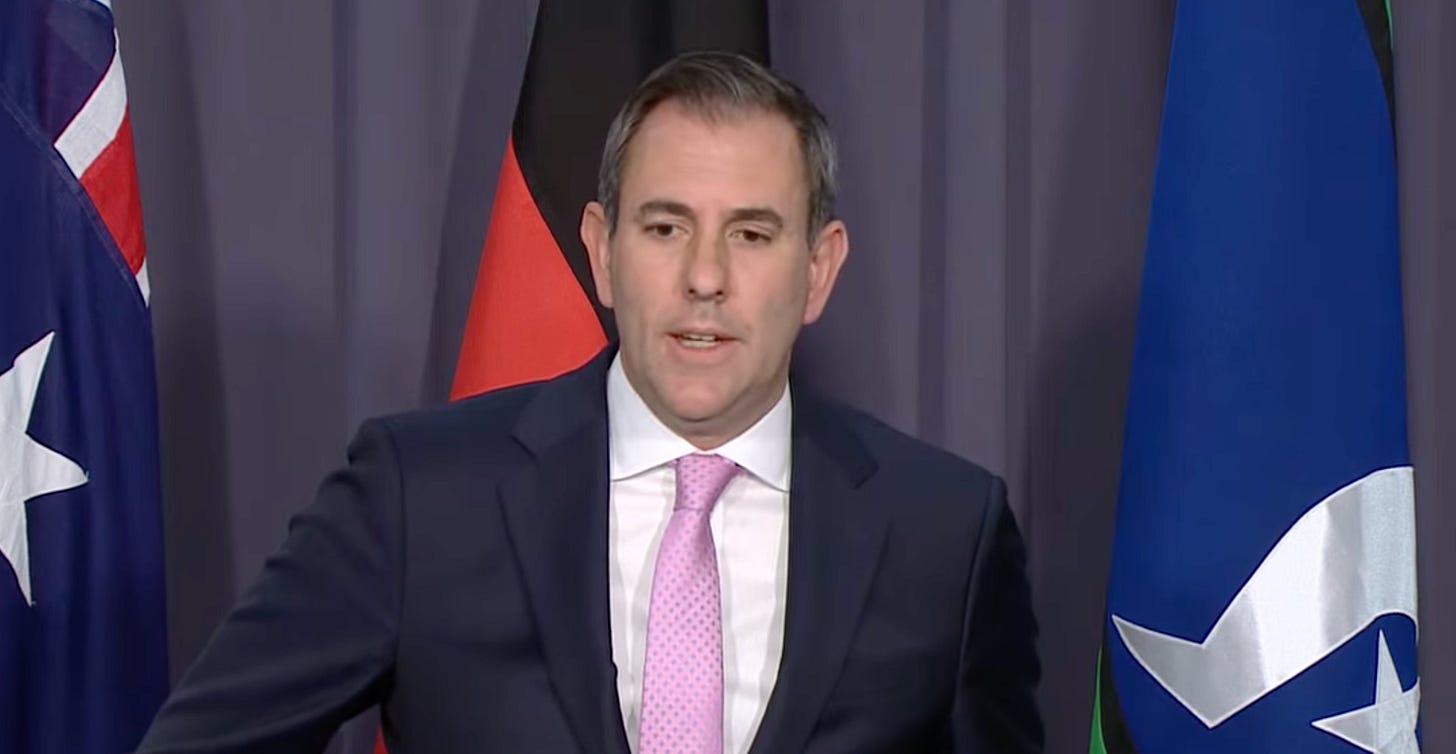Chalmers Targets Productivity as "Most Serious" Economic Challenge Ahead of Reform Summit
Australia confronts a decades-old productivity crisis that threatens long-term economic growth despite Tuesday's interest rate relief, Treasurer Jim Chalmers warned as he announced plans for an urgent reform summit next week.
While the Reserve Bank of Australia delivered its third rate cut in six months, bringing borrowing costs to two-year lows, Chalmers used the announcement to spotlight deeper structural problems plaguing the nation's economy.
"Productivity is the most serious economic challenge we have in our economy when it comes to those persistent structural issues," Chalmers said during a press conference in Canberra. "Productivity is the main one and that's why it's the central focus of the Reform Roundtable next week."
The treasurer's emphasis on productivity concerns comes as the Reserve Bank's revised forecasts highlight the scale of the challenge facing Australia. The central bank noted that productivity issues are both global and longstanding, requiring sustained government attention.
"This challenge has been longstanding. It is also global, as the Reserve Bank points out, but it is substantial and it is the government's primary focus, not just next week at the roundtable, but indeed for the course of this parliamentary term," Chalmers said.
The productivity warning overshadowed what should have been an entirely positive economic announcement. The rate cuts will save mortgage holders approximately $4,000 annually for every $700,000 owed, providing immediate relief to millions of Australians facing cost-of-living pressures.
However, Chalmers made clear that short-term relief cannot mask longer-term structural weaknesses that have plagued Australia's economy for decades.
"The Reserve Bank also says that this challenge is a global challenge and a longstanding challenge. It's not a problem that emerged in our economy three years ago. It's a problem which has been a central feature of our economy for a couple of decades now, and it will take time to turn around as well," he said.
The government has allocated $900 million through a national productivity fund to tackle issues including regulatory red tape in the housing sector. When pressed whether this amount might be insufficient, Chalmers indicated the fund has not been fully committed but stopped short of promising additional resources.
"That fund has not been completely committed yet. So there's still a bit more to do out of that initial allocation. Let's see how that goes before we start committing extra money," he said.
Truth matters. Quality journalism costs.
Your subscription to The Evening Post (Australia) directly funds the investigative reporting our democracy needs. For less than a coffee per week, you enable our journalists to uncover stories that powerful interests would rather keep hidden. There is no corporate influence involved. No compromises. Just honest journalism when we need it most.
Not ready to be paid subscribe, but appreciate the newsletter ? Grab us a beer or snag the exclusive ad spot at the top of next week's newsletter.
Next week's Reform Roundtable will bring together federal and state leaders to address productivity challenges that require coordinated action across government levels. Chalmers will meet with state and territory treasurers Friday in preparation for the summit.
"So many of our economic challenges, productivity, resilience, sustainability, rely on the states and territories putting in as much effort as the Commonwealth is prepared to," he said.
The productivity focus reflects growing concern that Australia's economic recovery, while delivering lower inflation and interest rates, has not addressed fundamental competitiveness issues. The country's ability to generate sustainable growth without relying on interest rate cuts remains questionable.
"Our economy is not productive enough. It's not resilient enough in the face of all this international uncertainty," Chalmers acknowledged.
The Reserve Bank's forecasts likely include downward revisions to productivity assumptions, though Chalmers noted differences between the central bank's shorter-term outlook and Treasury's longer-term projections.
"The main difference between the Treasury's assumptions around productivity and the Reserve Banks is the RBA takes a much shorter period. They're talking about an assumption over the next couple of years. The Treasury assumption is a longer-run assumption around 10 years, and that's why the two assumptions aren't directly comparable," he said.
Beyond productivity, the government faces mounting revenue challenges that underscore broader economic transformation pressures. Tobacco excise revenue has fallen sharply as consumption drops, partly due to successful public health campaigns but also because of organized crime involvement in illicit tobacco markets.
"We'd like to see tobacco revenue come down because people are giving the smokes away. We don't want to see it come down because of illegal, often organised crime," Chalmers said, noting the government has devoted hundreds of millions of dollars to compliance efforts.
The shift toward electric and hybrid vehicles is also eroding the fuel excise tax base, forcing consideration of road user charges to maintain infrastructure funding. These discussions will likely feature in productivity reform talks.
"The tax base is changing over time as more and more people move away from internal combustion engine cars and more people go towards hybrids or fully electric cars. The tax base is changing as a consequence of that," Chalmers said.
The treasurer indicated road user charging remains on the reform agenda, with bipartisan recognition of the need to address long-term budget sustainability.
"Really for at least a year or two, we have said publicly that this is on the agenda. We've said that we've got an interest in fixing this. There is a longer term issue in the budget that we need to address and we'll take the time to get it right," he said.
While Tuesday's rate cuts provide immediate mortgage relief, the focus on productivity signals the government's recognition that monetary policy alone cannot solve Australia's economic challenges. The upcoming reform roundtable represents a critical test of political will to address structural issues that have constrained growth for decades.
Economic data improvements, including the introduction of monthly Consumer Price Index figures starting in October or November, aim to support better decision-making across the economy.
"We want to make it easier for everyone in the economy to make better decisions based on quicker, more accurate, broader data," Chalmers said.
The productivity challenge comes as living standards recover more slowly than initially expected, despite improvements in real wages and employment. This disconnect highlights the complex relationship between monetary policy success and underlying economic performance.
"The living standards measure is growing again in welcome ways, but we've got some ground to make up," Chalmers said.
The treasurer's message was clear: while interest rate cuts provide welcome relief, Australia's economic future depends on addressing productivity challenges that have persisted for decades. Next week's reform roundtable will test whether political leaders can move beyond short-term fixes to tackle the structural reforms needed for sustained prosperity.
The combination of immediate rate relief and longer-term productivity concerns reflects the dual nature of Australia's economic position - strong enough to deliver rate cuts while struggling with fundamental competitiveness issues that require urgent attention.
Got a News Tip?
Contact our editor via Proton Mail encrypted, X Direct Message, LinkedIn, or email. You can securely message him on Signal by using his username, Miko Santos.
As well as knowing you’re keeping Mencari (Australia) alive, you’ll also get:
Get breaking news AS IT HAPPENS - Gain instant access to our real-time coverage and analysis when major stories break, keeping you ahead of the curve
Unlock our COMPLETE content library - Enjoy unlimited access to every newsletter, podcast episode, and exclusive archive—all seamlessly available in your favorite podcast apps.
Join the conversation that matters - Be part of our vibrant community with full commenting privileges on all content, directly supporting The Evening Post (Australia)
Not ready to be paid subscribe, but appreciate the newsletter ? Grab us a beer or snag the exclusive ad spot at the top of next week's newsletter.











